Liz Fenwick's Blog, page 18
April 6, 2012
The Chichester Writing Festival - Part Five
 The final session at the Chichester Writing Festival was Kate Mosse chatting with the amazing Francesca Simon of Horrid Henry fame...without any further intro my notes...
The final session at the Chichester Writing Festival was Kate Mosse chatting with the amazing Francesca Simon of Horrid Henry fame...without any further intro my notes...Be aware that arbitrary decisions will come back to haunt you – 50 booksWrites one Horrid Henry per year; easy to become formulaic if in a rushBased on 2 sides of everybody, comic extremes, tensionGood memory for emotion in childhoodWhat would Henry do in an ordinary situation?He's locked in a battle and will never grow upMoody Margaret is her favourite18 million copiesShe writes by asking herself questions – for the Chessman it was why are they so miserableActual naming of a character sparked the story4 random people embarking on a quest – who knows whyNot a planner – needs to know what they are doing and whyWhat do they want – until that's answered the books has no energy- doesn't need to know anything elseIt's the momentumQuestion then answerA story is as long as it needs to be - always can cutSetting & timeShe had not run out of ideas but fears not writing wellShe hopes that she's learned she can make a bad first draft (they are always bad) better – trusting that nowOf course you get stuck – you're a writerSets a low word count, 500, which she knows she can achieveA terrible 12k is better than a perfect 0Professionals finish books
I took heart from that last comment as that was one of my biggest fears when I began writing fiction again - could I finish a book? Yes, I can and have now done it several times....
All in all I can't recommend the festival enough...I met and chatted with so many lovely people-just brilliant!

Published on April 06, 2012 22:05
April 5, 2012
The Chichester Writing Festival - Part Four
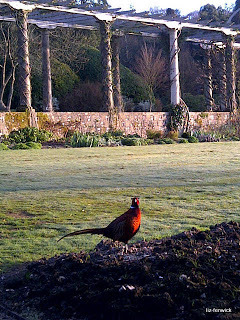 Sunday at the Chichester Writing Festival began with New Publishing and the panelists were - Alison Baverstock- publisher, trainer and writer, Dan Kiernan-writer and co-founder of new publisher Uboundand Adrian Weston agent.
Sunday at the Chichester Writing Festival began with New Publishing and the panelists were - Alison Baverstock- publisher, trainer and writer, Dan Kiernan-writer and co-founder of new publisher Uboundand Adrian Weston agent.Again the notes for this session are bitty...
DK Unbound – people buying into the work before hand, the audience is already thereThe author has to be entrepreneurDignity of author – content creatorAB Self- publishing is a process not a productHas to have value to someoneSelf-publishing teaches you about publishing, you have to replicate it all AW Agent representing self pubs on foreign rights
Not sure who to attribute these to...How do you boundary time – importance of creating something worth reading
Building and audience connectingMarket visibly and editorial
The second session on Sunday was Writing For Children with Sally Kindberg - artist and author, Bridget Strevens - author and illustrator and David Whitley-author. I only captured David's thoughts as the others were varied on illustrations and confession...one gave me a brilliant story idea and well my mind was off plotting...
D W Darkness – take it as far as it needs to goFocus on the emotion of the scene – then the scene will develop momentum – Greg MosseBegan with Fanfiction at 19 and is now 27 (see Joanna Trollope's comment from yesterday's notes)
Tomorrow my notes on Kate Mosse's chat with Francesca Simon...

Published on April 05, 2012 22:43
April 4, 2012
Chichester Writing Festival - Part Three
 As I mentioned yesterday I was nervous...I was going to be on a panel with three other writers - Shelley Harris, Adele Parks and Jane Sanderson and with Greg Mosse entitled Fiction-True- Because I Say So. Yesterday's post gave you the gist of the panel on non-fiction and I'm afraid I can't tell you anything about our panel except that it well received...and people were surprised at how supportive we all were of each other...
As I mentioned yesterday I was nervous...I was going to be on a panel with three other writers - Shelley Harris, Adele Parks and Jane Sanderson and with Greg Mosse entitled Fiction-True- Because I Say So. Yesterday's post gave you the gist of the panel on non-fiction and I'm afraid I can't tell you anything about our panel except that it well received...and people were surprised at how supportive we all were of each other...Just after lunch we had a panel on What They Want. The panellists were Felicity Bryant-agent, Jon Wood - publishing director at Orion and Stewart Ferris - co-founder of Summersdale Publishing and author. I took only a few notes and quite frankly they aren't much use to me or anyone except the stats from Orion that Jon quoted...
20% of all sales at Orion are from ebooks and it's higher in the SciFi at about 40-50%...he also commented that he doesn't just 'buy' a book but the author (not sure I phrased that correctly but I hope you can get the idea)
There were two great sessions in the afternoon but I was too drained to write notes...again appologies.
However a glass of wine or two and a meal I was able to take notes for Kate Mosse's wonderful interview with Joanna Trollope...after an exhausting day I doubt these are very reliable but here they are...
KM – The writers who are benevolent last – they love peopleJT...Story is how we do things – very keen on itYou can be far too young to write but never too oldNothing new about the human condition – she had something to say to her generation – she has a voiceHer earliest novel wasn't brave enough – didn't push it far enough…The ChoirShe listens to the world – what are the zietgiests, chronic eavesdropperShe starts with the story idea then characters…comes in a patchwork of characteristics…roams through the press for names until something fitsPlots the first 25k then plots the end – but then lets the rest develop organicallyMore of a notice rather than a writer, not a stylist, good on a good day, internal process – a journey that will lastThe spectacles through which we see the world – are words – where we feel most at homWriting is about humanityShe wrote the first novel on a full tank of fuel but the doesn't have the accumulated rocket fuel – a responsibility to the readers, more skill and assuranceBelieve a degree of vulnerability and anxiety is vitalConscious of creative engineering to make characters different and reflective of her own reactions
How do you feel about being too young to write? I tend agree but on Sunday one of the writers was just 27...maybe it depends on what you are writing and who for????

Published on April 04, 2012 22:16
April 3, 2012
Chichester Writing Festival - Part Two
 So Saturday arrived, day two of the Chichester Writing Festival, and to say I was a bit nervous would be the truth and it is reflected in my notes...they are not as comprehensive...apologies
So Saturday arrived, day two of the Chichester Writing Festival, and to say I was a bit nervous would be the truth and it is reflected in my notes...they are not as comprehensive...apologiesThe first session of the morning was on non-fiction and the panel...
Claire Winyard – director of TV drama and documentaryCan't create anything good out of bad fictionCommercial constraints are good, pressure is good Brian Viner – journalist, TV critic and author of comic non-fictionIt's all in the editingPhil Hewitt - arts editor and non-fiction authorThe skill isn't in doing it fast but in keeping going
Can't attribute the comment below but they came out of the discussion...You as author are best bested to publicized your bookThe story has a universal appeal-the power of the characters, not the setting-emotional power-universal storyHelp the author think big
The other big issue that came out this session was that somehow non-fiction was perceived as less than fiction. I confess this question took me by surprise because in my own head I thought it was the other way around....but the comment 'it reads like fiction' was used to demonstrate that fiction was held above....
What do you think...is non-fiction the second class citizen?

Published on April 03, 2012 22:03
The Chichester Writing Festival - Part One
 Well, I'm back to reality and Dubai after a fabulous weekend at the Chichester Writing Festival in amazing West Dean! This, excuse me while I do a small happy dance, was my second literary festival.... I'm still not used to this idea that people might want to listen to what I have to say.
Well, I'm back to reality and Dubai after a fabulous weekend at the Chichester Writing Festival in amazing West Dean! This, excuse me while I do a small happy dance, was my second literary festival.... I'm still not used to this idea that people might want to listen to what I have to say.Before I share some of my notes (because how could I attend a festival and not be the usually geeky me???) I want to say say a huge thanks to Greg Mosse who puts this amazing festival together in this glorious location. Greg is the moderator for all the session bar the main evening ones where his wife the amazing writer Kate Mosse conducts the interviews. Both of them do brilliant jobs...
Now while on the flight back yesterday when I hit a stuck point, unfortunately a frequent occurrence at the moment with August Rock, I wrote up my notes...
 Today I'll share the ones from Kate's chat with crime writer Mark Billingham...as with all these posts - these are just my notes and are imperfect....
Today I'll share the ones from Kate's chat with crime writer Mark Billingham...as with all these posts - these are just my notes and are imperfect....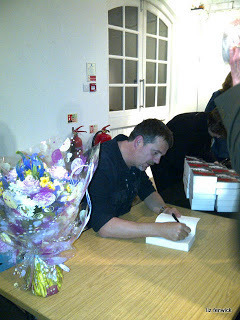 Kate Mosse Interview with Mark Billingham
Kate Mosse Interview with Mark Billingham-Novel is performance- you're trying to entertain the reader- he gives a book 50 pages-changed course – 3 books in they were starting to get samey- less is more; less violence now he's a better writer-doesn't do the work for the reader – just nudge the reader- harder to make readers care – that's the most important – then you have tension- small images that count- the shoes in the road not the bomb blast- what the violence does to people – not the violence itseld- research less & less , you need to get things right, you learn what you need to know, don't crow bar the info into the book- Social Media – displacement like looking out the window, uses Twitter more than FB- want to do everything in dialogue because of his background in TV….live or die on the strength of dialogue-doesn't write everyday-only if you have another job; most of 'the job' happens when not at the keyboard-he writes without a plan like driving into the fog...kinda like you know where you are going but can only see as far as the headlights- you sit down and go to work making things up- LUCK

Published on April 03, 2012 00:02
March 22, 2012
Editing is Hard Work - How Do You Know Your Work Is Good Enough
Sarah Duncan has been running a great series of posts on editing. The latest one is here. The big thing is that editing is hard work. I can hear my inner student SIGH. I hate hard work or at least I did. I have learned to love it. Back when I mentioned I was on the 27th draft of August Rock people were amazed so I outlined my process (here). It's long and there are no short cuts. But in the past I would try and find them...The result was that I short changed myself and didn't get the result I wanted (an agent, a publishing deal and an audience for my stories).
Look at it this way...if you want muscles you need do strength training (unless you are still growing when it appears that food and sleep are the only requirement - casts glance at sleeping teens). If you want to be a concert pianist then you practice. If you want a publishable book you have to write, rewrite and edit. I know there may well be a few cases out there where the first draft was flawless but they are rare. So if publication is your goal embrace the work.
For make no mistake it's work and at times I rebel against this. I am lazy at heart. I don't want to read the damn thing 300 hundred times. I don't what to check my verbs, adverbs, adjectives....I don't want to look at each chapter, scene, paragraph and sentence. But I must if I want readers to love the story and not feel the writing. I make sure that each word, each sentence and so on is there for a reason - and just because I like isn't good enough. As Donald Maass reminds again and again in his books...tension is the key to page turning quality...this of course is another matter altogether but while you are examining your writing so closely that should be in the back of your mind....more on this later.
So coming back to that issue...how do you know your work is good enough? Does every word in your story carry its weight and move your story forward? Each sentence? Paragraph? Scene? Chapter?
Now be honest...have you looked that closely? If not check out Sarah's posts because they are a good starting point.

Look at it this way...if you want muscles you need do strength training (unless you are still growing when it appears that food and sleep are the only requirement - casts glance at sleeping teens). If you want to be a concert pianist then you practice. If you want a publishable book you have to write, rewrite and edit. I know there may well be a few cases out there where the first draft was flawless but they are rare. So if publication is your goal embrace the work.
For make no mistake it's work and at times I rebel against this. I am lazy at heart. I don't want to read the damn thing 300 hundred times. I don't what to check my verbs, adverbs, adjectives....I don't want to look at each chapter, scene, paragraph and sentence. But I must if I want readers to love the story and not feel the writing. I make sure that each word, each sentence and so on is there for a reason - and just because I like isn't good enough. As Donald Maass reminds again and again in his books...tension is the key to page turning quality...this of course is another matter altogether but while you are examining your writing so closely that should be in the back of your mind....more on this later.
So coming back to that issue...how do you know your work is good enough? Does every word in your story carry its weight and move your story forward? Each sentence? Paragraph? Scene? Chapter?
Now be honest...have you looked that closely? If not check out Sarah's posts because they are a good starting point.

Published on March 22, 2012 00:42
March 20, 2012
Head-space and Editing
 Head-space is a funny old term...but an important one when editing ,well, for me any way. What I mean by this is the ability to think of the story or large chunks of the story as a whole. In theory this should be easy but I find that in practice it can be very hard, especially for the writer. I don't know about others but when writing I am intent on the that scene, that moment in time and frequently can forget the everything else like how it fits into the story and all it's ramifications. My heads starts getting fuzzy just thinking about it...But boy is it important. Think of it as a camera on close focus and then pulling back to wide angle...I'm struggling to pull things into focus in wide angle....
Head-space is a funny old term...but an important one when editing ,well, for me any way. What I mean by this is the ability to think of the story or large chunks of the story as a whole. In theory this should be easy but I find that in practice it can be very hard, especially for the writer. I don't know about others but when writing I am intent on the that scene, that moment in time and frequently can forget the everything else like how it fits into the story and all it's ramifications. My heads starts getting fuzzy just thinking about it...But boy is it important. Think of it as a camera on close focus and then pulling back to wide angle...I'm struggling to pull things into focus in wide angle....At the moment I using draft 26 of August Rock as the starting point and draft 3 as a reference point for the of writing draft 27. In draft 26 I knew my voice (discovered it writing The Cornish House and the books that followed) and I knew I'd lost it in August Rock somewhere between say draft 5 and 25. So my goal for draft 26 was to put my voice back into the story which meant to darken it...not in a bad way but make it deal with more than just boy meets girl. I think on the whole I achieved it. I can't remember what the goal of draft 3 was other than to improve, but draft 3 contains the hero's pov view and lots of deleted scenes that I find I'm needing for their details - those terribly important things that ground a scene.
So for draft 27 I'm changing from 3rd person to 1st...this does not just mean changing from she to I - oh, how I wish it did. It means re-envisioning each scene and rewriting it. In my head it's not what does Judith see but what do 'I' see and feel. What am 'I' thinking?
At the same time, I have given a character a Lazarus moment... all the previous drafts the story had begun after he was in the ground or about to be put in it. Now he's alive and kicking for the first 5th of the book which mean I'm moving scenes willy nilly and trying to hold onto so many different considerations that I'm finding I struggle with head space to put the whole picture together.
I think if I could use index cards this would help but past attempts have proved futile. I just feel so spacey and long for the clarity of the first draft when I can just write through the story and not try and weave the old with the new....I wish there was a magic wand to clear away the fog but there isn't. I must use instinct to clear and hope I can fix the gaps later when I feel the story is finally coming together.
Do any of you struggle with head-space?

Published on March 20, 2012 02:02
March 16, 2012
Going Back in Time - on the Blog and on The Cornish House
The past two posts have been well received...thank you. So that had me thinking about my drafts and my process as it has developed. Then I remembered an exercise that I did on the first scene of The Cornish House...and particular on verbs. Yes, verbs...those action things that motor our stories along.
Here's the post.
Now first let me say you would go mad if you did this through a whole 100,000 word script (however it might be better for it) but it's a very useful exercise on a scene or two to check how you are doing on the language front.
I also found it interesting as this was done in 2009 and the first page is different now...although much of it's the same....I wonder if I fished around in my archives what the original first page looked like back in 2006.
Here's page one out of the bound uncorrected proofs...can't remember what changed on this post copy edits and proofing...
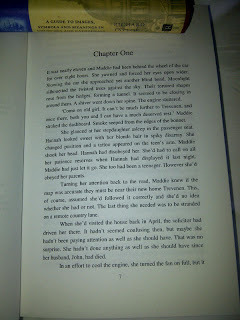
Have you ever scrutinized your wirting like this? has it helped?


Here's the post.
Now first let me say you would go mad if you did this through a whole 100,000 word script (however it might be better for it) but it's a very useful exercise on a scene or two to check how you are doing on the language front.
I also found it interesting as this was done in 2009 and the first page is different now...although much of it's the same....I wonder if I fished around in my archives what the original first page looked like back in 2006.
Here's page one out of the bound uncorrected proofs...can't remember what changed on this post copy edits and proofing...

Have you ever scrutinized your wirting like this? has it helped?

Published on March 16, 2012 03:00
March 14, 2012
Growing As A Writer - When Is It Good Enough?
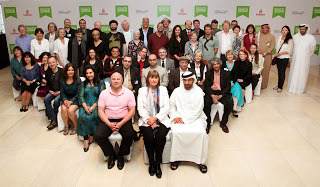
Official Group Photo of the Authors at EAFOL
Yesterday I mentioned I'm on my 27th draft of August Rock. Before I clarify, let me say that I also began book eight this November and August Rock was book two. Just wanted you to know that I didn't spend all my time polishing one book. Instead, I write a new one then go back and take all that I learnt from writing that one and apply it to August Rock or until recently The Cornish House or whatever the current book is.
Also a bit like when you are learning the piano...or at least how i remember it. You learn a piece of music in parts...left hand then right or vice versa. Well for me - with each rewrite I focused on a different aspect because I still had so little experience that I couldn't do an edit for pace, look at spelling and at continuity at the same time. Each phase of editing was new to me so they had to be kept apart. I still can't do all the editing required in one pass...
So if I were set my process out it would look like this...
a. write dirty first draft
b. leave it alone and edit previous book
c. maybe write synopsis for story now that I know my character and what will happen thanks to step a. I also look at this point to see if I have any themes - I usually do but I don't know them or see until the first draft is done
d. look a the twists and turns of the story...are there places where i can turn up the heat and make things worse for my heroine? This draft is about upping the conflict and also beginning to look at pace
e. leave it alone and rework another story which is at a different stage
f. at this point I look at the words...in the past this might have been a couple of drafts, but now seems to be one. I look at verbs - am i always using the same one? Are they strong enough or are they fiddly? I look at word choice - again am I always using the same ones - I get certain words into my head and use them to death...
g. rework another script
h. now I look at sentencse and paragraphs... do they vary? are they in the right order? (see my comment yesterday about page 2 of The Hunger Games - boots before trousers) are they necessary??? This phase hits on my key weakness - repetition.
i. work on another script
j. look at the story at a whole again and break it into chapters - make sure that each chapter grabs you at beginning and end. Finally does the promise of chapter one get fulfilled in the last chapter...
Long process isn't it and now with adding an agent and an editor it becomes longer...
k. agents sees things I've missed and I work on her suggestions
l. editor can see the book as whole in a way I don't think I'll ever be able to...so I will rework again
m. copy editing...who knew my characters sat up so straight so often!
n. proof reading...
o. letting go....
It is true a book is never 'done' until it's published...
Looking at my 'process' above, it sure seems like a lot of work and it is. But I can hope that as I grow as a writer somethings will become instinct, but i know it will always be hard work because I always need to be pushing myself to be a better writer. And by that I mean in the technical/words department and in the story stakes...I was never going to be a concert pianist - i didn't have the passion, skill or most importantly the hunger. However I want to be the writing equivalent of of that and that means all this 'practice' draft after draft will help me reach my goal - being read.
So now I'm working on August Rock with new eyes...and it's exciting and scary. I want it to be better, need it to be better...
How many drafts do you do? And how much do you try an achieve in a draft?

Published on March 14, 2012 22:47
How Do You Know It's Good Enough - Part 2
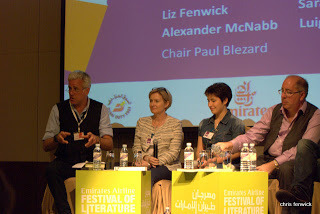 I know I owe you a few posts about the Emirates Airlines Festival of Literature but I keep coming back to the question of how do you know when your work is ready. This of course does tie into the discussion that came up at the panel on First Fictions...
I know I owe you a few posts about the Emirates Airlines Festival of Literature but I keep coming back to the question of how do you know when your work is ready. This of course does tie into the discussion that came up at the panel on First Fictions...First off let me state...the first draft is never the one to send.
And in my case nor was the sixth for The Cornish House. It was the seventh. At the moment I am working on book two of my contract with Orion, August Rock. This will be draft 27, yup 27. August Rock is the book that i really began to learn the skill required to write and I wrote the thing to death. Now I am trying to breath life back into a good story...
This morning in order to find a scene I had long since cut, I went back to 2007 or to be precise draft two (remember nothing is ever wasted). Now the scene is written in a point of view that no longer exists but the concrete details of the setting were what I was looking for...they are like gold dust. Much of the writing made me wince...and yes, this version was submitted and rejected. And boy do I know why now.
So I come back to when is it ready...first, it's not ready because you are heartily sick of it or your brother told you it's good, unless of course your brother is Jonny Geller. It's not ready if it's still filled with mistakes..grammar, spelling or otherwise...
Luigi Bonomi stated clearly in the First Fictions section that the spark has to be there in the first three pages...ideally on the first.
So they are not going to see the great story if they are pulled out of it by mistakes...I know there are huge success stories out there with bad writing but they are few. More importantly is that what you want people to saying about your book...great story but crap writing. My hope is that my writing serves the story...it should be invisible.. But that's me and others may well feel differently but never does bad writing help a story unless that what's it's about...Saw a link again this morning to the book HOW NOT TO WRITE A NOVEL...it had me howling with laughter which of course is it's intention.
So as a test - pick out your favourite book in your genre and then your book and have someone else read the first three pages aloud... now in all honesty how does your compare? Good? OK? Needs work?
Don't submit yet if your in your heart know that it needs a bit more work but you're thinking ...surely the agent/publisher will see through that...they won't. They don't have time. Treat them with respect and polish that submission to within an inch of it's life...you may only have one shot.
ps...I can tell I am truly a nerd now thanks to being edited - copy edited and proofed. In the fabulous YA book the HUNGER GAMES I was pulled out of the story on page two...
'I swing my legs off the bed and slide into my hunting boots. Supple leather that has moulded to my feet. I pull on trousers, a shirt, tuck my long dark braid up into a cap, and grab my forage bag.'
I was out of the story...trying to figure how she put her boots on before her trousers...what type of boots or trousers can you do this with... Yes I know I am very sad...But I need to hold onto that to apply it to my own work....but not in the first draft- there my characters run free and dress as they damn well please

Published on March 14, 2012 02:23



